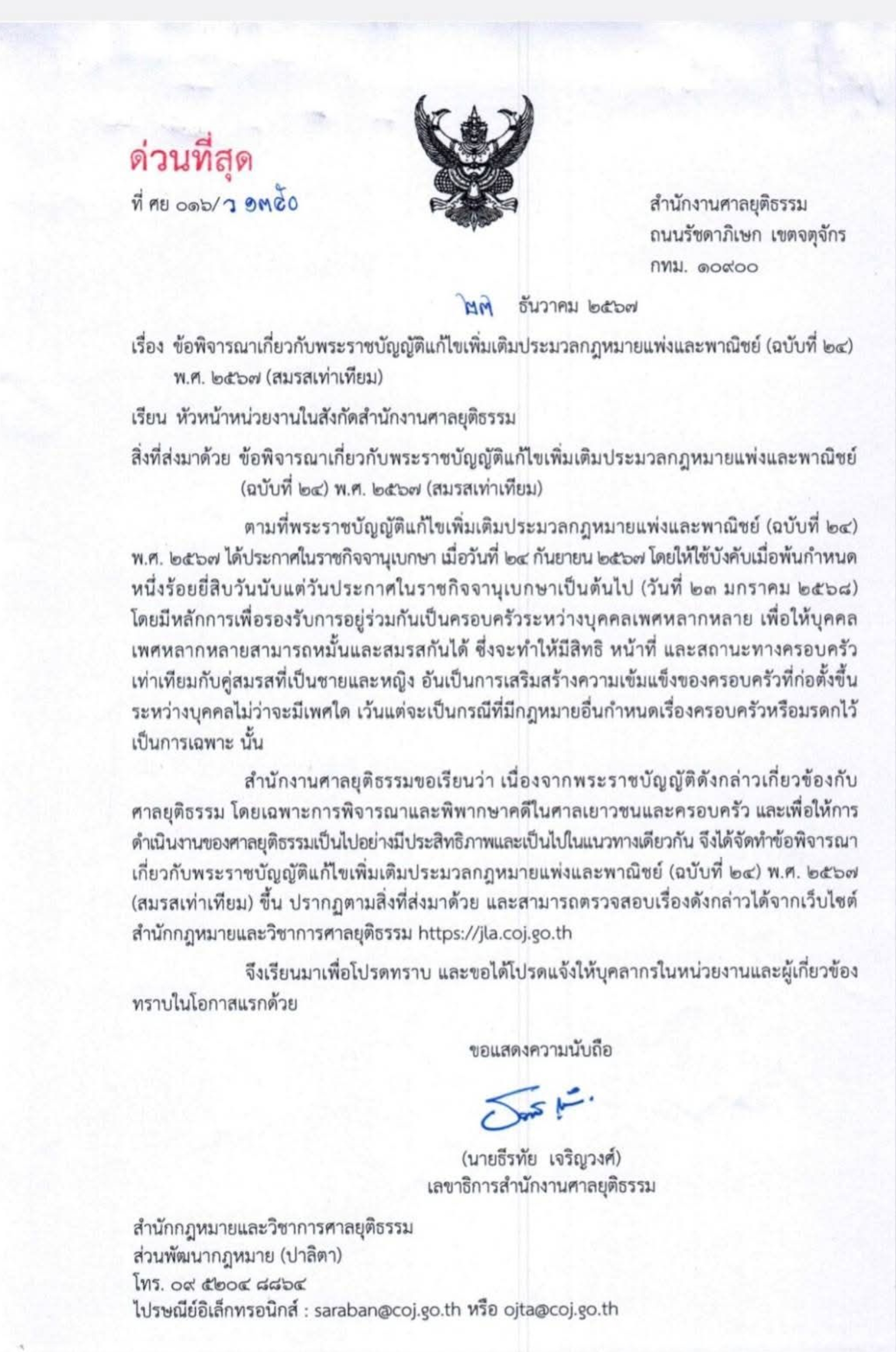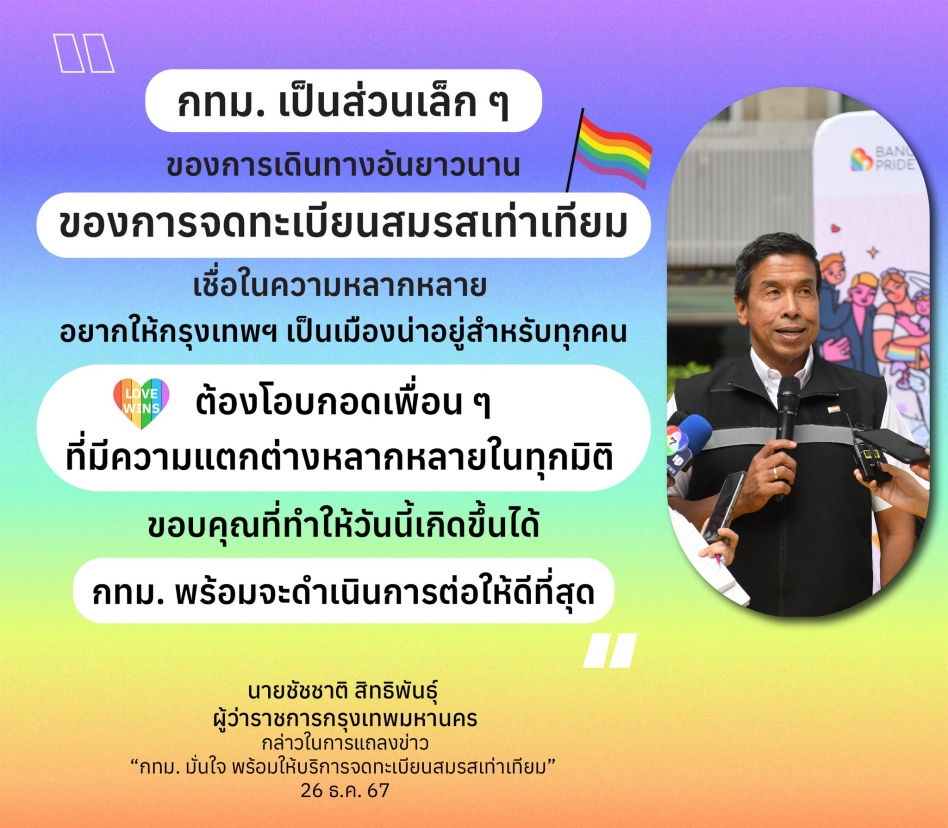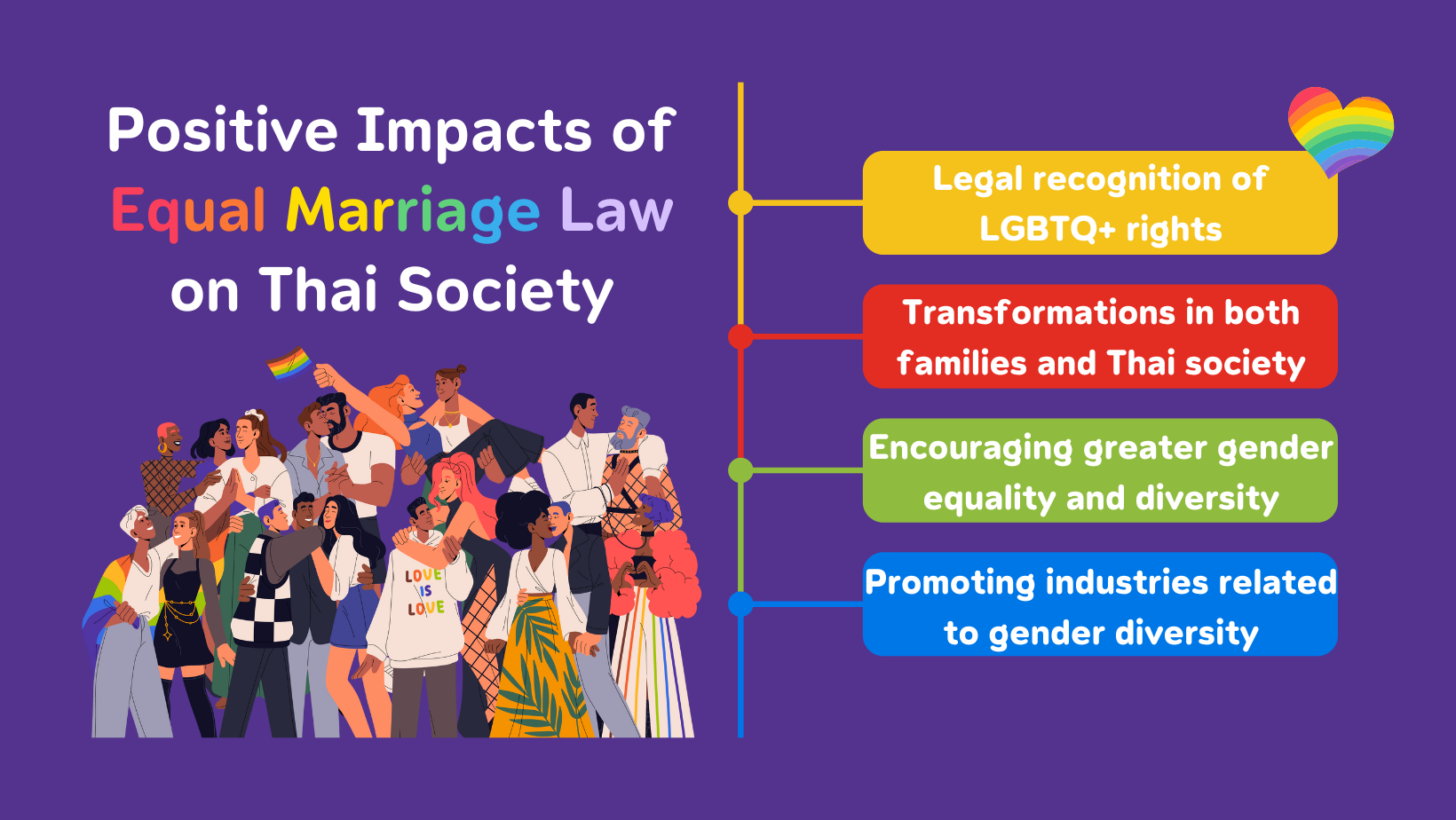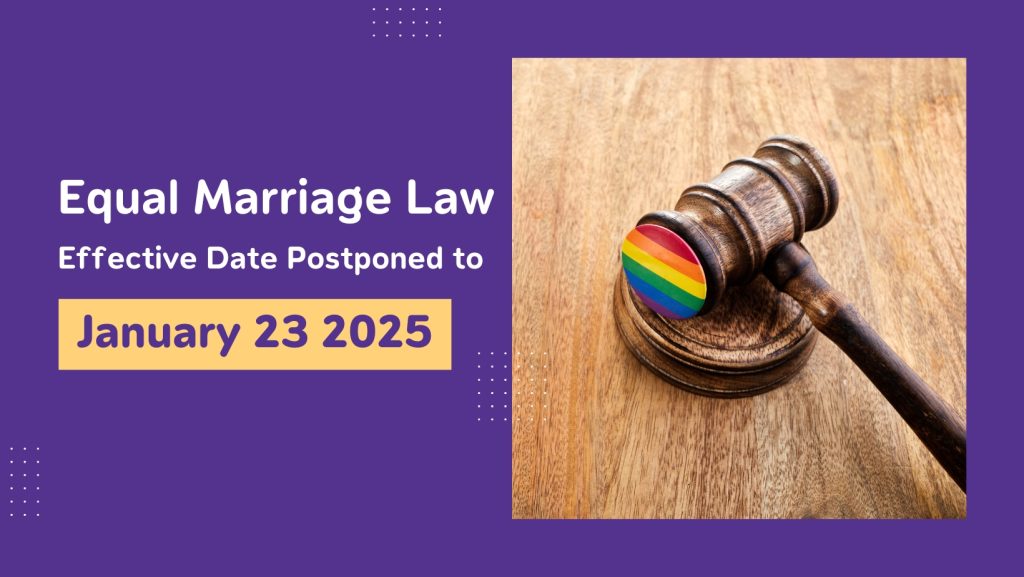On Thursday, January 2, 2025, the Office of the Judiciary issued an important announcement regarding the Amendment to the Civil and Commercial Code Act (No. 24) B.E. 2567, commonly known as the Equal Marriage Law. The announcement stated that the law will officially come into effect on January 23, 2025, rather than the initially anticipated date of January 22, 2025. This announcement marks a significant milestone in Thailand’s history, reflecting efforts to promote equality and human rights.
Equal Marriage Law – A Significant Transformation
The Equal Marriage Law amends the Civil and Commercial Code to allow same-sex couples to legally register their marriages and enjoy the same rights as opposite-sex couples. This change not only impacts familial relationships but also promotes equality in other areas, such as property rights, inheritance, medical decision-making, and social security benefits.
The effort to enact the Equal Marriage Law began with advocacy from civil society, human rights groups, and organizations supporting LGBTQ+ rights. This battle for equality spanned many years and faced numerous challenges, including societal misunderstandings, religious conflicts, and opposition from certain political factions.


Preparations for the Equal Marriage Law by Civil Society & Bangkok
Preparations to implement the Equal Marriage Law involve not only the government but also the collaboration of civil society and related organizations. These efforts aim to ensure a smooth and efficient enforcement of the law. Key focuses of these preparations include fostering understanding of gender diversity, organizing related activities, and enhancing the readiness of service systems to accommodate the law’s provisions.
The Role of Civil Society in Supporting the Equal Marriage Law
- Raising Public Awareness
- Civil society and LGBTQ+ rights advocacy groups play a vital role in educating the public about the Equal Marriage Law. These efforts include producing educational media, hosting discussions, and organizing public events to disseminate information as widely as possible. This public awareness campaign aims to foster a deeper understanding of the law and its importance for equality.
- Symbolic Activities
- One significant initiative was the symbolic equal marriage registration event originally scheduled for January 22, 2025, at Paragon Hall, Siam Paragon. The event aimed to create a positive societal image and acceptance of same-sex couples. Although the schedule had to be adjusted to align with the law’s official enforcement date on January 23, 2025, the preparation and intent behind this event demonstrate the commitment to supporting equality and inclusivity.
- Legal Support and Consultation
- Many organizations provide legal advice and assistance to same-sex couples interested in registering their marriages. These services include helping with the preparation of necessary documents and guiding couples through the related processes. Such initiatives ensure that couples are well-informed and supported as they navigate the legal framework introduced by the Equal Marriage Law.


Bangkok’s Readiness for the Equal Marriage Law
- Preparation of Facilities
- Bangkok Metropolitan Administration (BMA) has ensured readiness in terms of marriage registration facilities, including district offices and various service centers. Personnel have been allocated and trained on gender diversity to provide efficient and friendly services to all citizens. This preparation underscores the commitment to inclusivity and professionalism in service delivery.
- Development of Tools and Operational Systems
- Relevant agencies have worked on improving systems to accommodate equal marriage registrations. This includes updating information systems and official documents to suit the needs of same-sex couples. These updates are designed to ensure equality at every stage of the process, aligning with the principles of the Equal Marriage Law.
- Community-Level Awareness and Understanding
- BMA has also focused on educating local communities and frontline staff about the Equal Marriage Law. This initiative aims to prevent misunderstandings and discrimination, fostering a more inclusive and supportive environment for implementing the new law. By prioritizing education and awareness, BMA seeks to build a foundation for long-term social acceptance and equality.
Challenges in Implementing the Equal Marriage Law
Although the Equal Marriage Law represents a significant step forward in promoting human rights and equality in Thailand, its implementation faces several challenges that must be addressed and resolved to ensure that citizens fully benefit from the legislation. These challenges include the following:
| Challenge | Solution | |
Delays in Administrative Processes |
One of the main challenges is the issuance of directives and related operational guidelines by government agencies. For instance, the Ministry of Interior has yet to finalize and sign the necessary orders, leading to confusion among government agencies about the procedures and the official date when the law will come into effect. | Relevant agencies should expedite the issuance of directives and develop operational manuals to ensure all parties have a clear and consistent understanding. Additionally, transparent and clear communication with the public is essential to minimize confusion. |
Lack of Readiness in Local Government Agencies |
While Bangkok is highly prepared to implement the law, some areas of the country, particularly in rural provinces, may still face resource shortages. These include a lack of trained personnel on gender diversity and operational systems aligned with the new law. | Providing training for personnel at all levels, especially in local government offices, is crucial. Additionally, allocating further resources, such as upgrading information systems and official documents, as well as securing support from the central government, is essential to address these shortcomings and ensure nationwide readiness. |
Addressing Misunderstandings in Society |
In some segments of society, misunderstandings persist regarding the Equal Marriage Law. These include perceptions that it undermines traditional values or incites conflict within families and communities. | Raising public awareness about the importance of gender equality and human rights is essential. This can be achieved through awareness campaigns, public discussions, and integrating educational content into school curriculums to instill understanding from a young age. These efforts aim to promote accurate perceptions and foster a more inclusive society. |
Opposition from Dissenting Groups |
While the Equal Marriage Law has garnered support from the majority, some groups, such as religious organizations, conservatives, or traditionalists, remain opposed. These groups may express dissatisfaction and attempt to exert pressure on the government. | Creating platforms for constructive dialogue and exchanging opinions can foster better understanding. Providing education based on accurate information and emphasizing the societal benefits of the law can help alleviate resistance and build broader acceptance over time. |
Legal Challenges and Court Procedures |
Although the Equal Marriage Law is officially in effect, interpreting the law in court or resolving disputes regarding the rights of same-sex couples may present challenges that require clarity and well-defined practices. | Developing clear legal interpretation guidelines by the judiciary is essential. Establishing standardized procedures for officials and forming specialized legal advisory teams for same-sex couples can provide support and reduce long-term issues. These measures will help ensure consistent application and uphold the rights protected under the law. |
Changes in Official Documents and Information Systems |
Adjusting official documents such as marriage certificates, identification cards, and other data systems to accommodate equal marriage may require significant time and resources for implementation. | Relevant agencies should expedite updates to information systems and official documents to align with the new law. Collaborating with technology departments or partners can help accelerate these adjustments, ensuring that the administrative process is efficient and seamless for all citizens. |

Positive Impacts of Equal Marriage Law on Thai Society
The Equal Marriage Law represents a significant milestone that not only transforms the legal framework but also brings profound positive impacts to Thai society across various dimensions. These include promoting human rights, fostering changes in families and communities, and serving as an inspiration for other nations.
1. Promoting Human Rights
- Impact at the National Level
- The Equal Marriage Law formally recognizes the rights of LGBTQ+ individuals, eliminating discrimination and providing everyone with the opportunity to live according to their desires without gender-based restrictions. This law also grants same-sex couples the same rights and responsibilities as opposite-sex couples, ensuring equality under the law for all.
- Impact at the International Level
- The implementation of this law positions Thailand as a nation committed to upholding human rights, earning recognition and respect from the global community. This commitment enhances confidence from other countries and international organizations. Additionally, it establishes Thailand as a role model in the region, inspiring neighboring countries that have yet to fully recognize the rights of LGBTQ+ individuals.
2. Changes in Families and Society
- Promoting Equality within Families
- Families with LGBTQ+ members often face discrimination or a lack of societal acceptance. The implementation of the Equal Marriage Law provides legal recognition and stability to same-sex couples, enabling them to live confidently and proudly as families. This legal support fosters a sense of security and equality within their households.
- Societal Transformation
- The law encourages Thai society to be more open and accepting of diversity. Discussions around gender diversity are now viewed in a more positive light, contributing to a decrease in discrimination. This shift helps create an inclusive and harmonious environment where all individuals can coexist peacefully.
3. Setting a Positive Example in the Region
- Inspiring Other Countries
- The adoption of the Equal Marriage Law in Thailand serves as a significant catalyst that may encourage other Southeast Asian nations, such as Malaysia, Indonesia, or the Philippines, to reconsider and revise their laws to align with international human rights standards. This progress could pave the way for broader acceptance of LGBTQ+ rights across the region.
- Building Collaborative Networks
- Thailand has the opportunity to lead efforts in establishing international networks focused on human rights and gender equality. Collaborating with global organizations, such as the United Nations or Human Rights Watch. Can drive positive change not only in Southeast Asia but also on a global scale. These partnerships can enhance regional cooperation and advocacy for a more inclusive society.
4. Economic and Cultural Transformations
- Economic Impact
- The implementation of the Equal Marriage Law has the potential to boost economic growth through related industries. These include wedding planning, LGBTQ+ tourism, and investments from companies that advocate for equality. Furthermore, the law enhances Thailand’s image as an LGBTQ+-friendly destination, attracting international visitors and investors who value inclusivity and diversity.
- Cultural Impact
- This law stimulates artistic, literary, and media expressions that reflect gender diversity, fostering a more open and creative cultural landscape. By promoting inclusivity, the Equal Marriage Law encourages the evolution of a society. That celebrates and respects diverse identities and perspectives.
The Equal Marriage Law extends beyond legal rights, exerting a positive influence on societal and economic structures. Its implementation elevates Thailand as a nation that champions equality and human rights, fosters stable families, and inspires change across Southeast Asia. This progress paves the way for a society that genuinely embraces diversity and equality.
Read More Articles
The Equal Marriage Law represents a pivotal step that underscores Thailand’s commitment. To creating an inclusive and equitable society that embraces gender diversity. While challenges remain in its implementation. Collaboration across all sectors will be critical to ensuring the law’s success. And driving meaningful, positive change both within Thailand and on the global stage.
As the law officially comes into effect on January 23, 2025, it opens a new chapter for same-sex couples. Granting them the legal recognition to build stable and fulfilling lives together. This milestone serves as a clear signal that Thailand is progressing toward. A brighter future, one rooted in equality, respect, and inclusivity.
References:
ช้ากว่าที่คาด! ศาลยุติธรรม แจ้งสมรสเท่าเทียมมีผล 23 ม.ค.นี้
- theactive.thaipbs.or.th/news/gendersexuality-20250102
ปีหน้าใช้จริง!! Soft Power สมรสเท่าเทียมจุดขายใหม่ที่ยังต้องอุดช่องโหว่
- mgronline.com/live/detail/9670000124944
สิทธิพลเมืองทั่วโลก ก้าวหน้า-ถดถอยอย่างไร ในปี 2567
- bbc.com/thai/articles/c4gz88k74q0o

